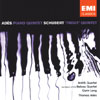Adès; Schubert Piano Quintets
Unlikely companions, but Adès and Co offer bracing views of these quintets
View record and artist detailsRecord and Artist Details
Composer or Director: Thomas Adès, Franz Schubert
Genre:
Chamber
Label: EMI Classics
Magazine Review Date: 8/2005
Media Format: CD or Download
Media Runtime: 62
Mastering:
Stereo
DDD
Catalogue Number: 557664-2

Tracks:
| Composition | Artist Credit |
|---|---|
| Quintet for Piano and Strings, 'Trout' |
Franz Schubert, Composer
Alasdair Tait, Cello Corin Long, Double bass Corina Belcea, Violin Franz Schubert, Composer Krzysztof Chorzelski, Viola Thomas Adès, Piano |
| Quintet for Piano and Strings |
Thomas Adès, Composer
Arditti Qt Thomas Adès, Piano Thomas Adès, Composer |
Author: kYlzrO1BaC7A
Thomas Adès features both as composer and pianist on this new release: two piano quintets which, though composed 182 years apart, are equally alive with formal and expressive provocations. That said, expression per se is not really an issue in Adès’s Piano Quintet (2001). The single movement places its sonata-form emphasis so the near-literal repeat of an already evolving exposition (track 1, 6’20”) takes on a strongly developmental feel, with the development (track 2) then assuming the guise of a varied reprise, and the brief recapitulation (track 3) becoming almost a transition that anticipates the coda (2’30”).
It all amounts to an intriguing rethink of an age-old medium, though one whose musical material is so geared up to the unfolding of the formal process as to evince little intrinsic memorability beyond the pervasive opening motif. Adès and the Ardittis ensure a reading of unremitting clarity (for example, the climactic outburst at 2’20” into track 2), with perhaps a didactic element such as seems more than appropriate to the work itself.
Outwardly, nothing could be less didactic than the near-effortless spontaneity of Schubert’s Trout Quintet – though its often unpredictable formal transitions confirm the benign influence of Haydn and early Beethoven, while its taciturn tonal progressions anticipate the composer’s instrumental works of the 1820s. These are qualities to which Adès and the Belcea Quartet are responsive: listen to the hushed intensity going into the codetta of the first movement’s exposition (2’44”), the tellingly unquiet repose which opens the Andante’s second half (3’30”), or the lucidly drawn contrast between the last two variations of the fourth movement – making the return of Die Forelle itself (track 13) the more arresting.
As an overall reading, it lacks the unforced naturalness of Clifford Curzon and members of the Vienna Octet, or the sense of discovery which Alfred Brendel et al manage to convey with an even greater communicative zeal. Recorded sound, with the instrumental interplay palpably defined if lacking the final degree of spatial depth, is well suited to the interpretative stance that these performances bracingly convey.
It all amounts to an intriguing rethink of an age-old medium, though one whose musical material is so geared up to the unfolding of the formal process as to evince little intrinsic memorability beyond the pervasive opening motif. Adès and the Ardittis ensure a reading of unremitting clarity (for example, the climactic outburst at 2’20” into track 2), with perhaps a didactic element such as seems more than appropriate to the work itself.
Outwardly, nothing could be less didactic than the near-effortless spontaneity of Schubert’s Trout Quintet – though its often unpredictable formal transitions confirm the benign influence of Haydn and early Beethoven, while its taciturn tonal progressions anticipate the composer’s instrumental works of the 1820s. These are qualities to which Adès and the Belcea Quartet are responsive: listen to the hushed intensity going into the codetta of the first movement’s exposition (2’44”), the tellingly unquiet repose which opens the Andante’s second half (3’30”), or the lucidly drawn contrast between the last two variations of the fourth movement – making the return of Die Forelle itself (track 13) the more arresting.
As an overall reading, it lacks the unforced naturalness of Clifford Curzon and members of the Vienna Octet, or the sense of discovery which Alfred Brendel et al manage to convey with an even greater communicative zeal. Recorded sound, with the instrumental interplay palpably defined if lacking the final degree of spatial depth, is well suited to the interpretative stance that these performances bracingly convey.
Explore the world’s largest classical music catalogue on Apple Music Classical.
Included with an Apple Music subscription. Download now.

Gramophone Digital Club
- Digital Edition
- Digital Archive
- Reviews Database
- Events & Offers
From £9.20 / month
Subscribe
Gramophone Club
- Print Edition
- Digital Edition
- Digital Archive
- Reviews Database
- Events & Offers
From £11.45 / month
Subscribe
If you are a library, university or other organisation that would be interested in an institutional subscription to Gramophone please click here for further information.






